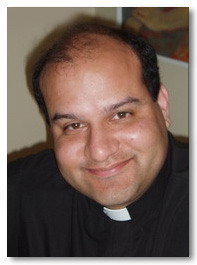The porous line between Church and State
- FATHER RAYMOND J. DE SOUZA
Co-operation between church and state? We neednt even go that far. It would be a step forward to simply recognize that religious believers are as much citizens as are secularists.
 |
Fr.
Raymond de Souza |
‘Co-operation” between church and state? Shouldn’t that be “separation,” “conflict” or even outright “hostility”?
With the announcement by the federal government that same-sex marriage will be on the parliamentary agenda this fall, it won’t be long before we start hearing the accusation that religion is “intruding” into politics.
But does religion really intrude upon politics at all? For the past two days, speakers here at a conference organized by the Ottawa-based Centre for Cultural Renewal explored just that — making the case that Canadian history shows that religion can play a robust role in public life.
Iain Benson , executive director of the Centre, argued that “co-operation” ought to characterize the relationship between religion and the state. He rejects “separation” if it means “an unbridgeable and non-co-operative division” between the two, while acknowledging that there should be a “jurisdictional difference.” Benson’s position is that legal separation is one thing, but the attempt to exclude religion’s influence from public life is altogether different, and detrimental to the common good.
It’s not so much that the preachers and the politicians should co-operate amongst themselves, but that religious citizens should not have to pretend to not be religious to participate in public life.
“Religious liberty begins with the right to worship according to one’s conscience, but it does not end there,” said Bishop Frederick Henry of Calgary, who addressed the conference yesterday. “Religious freedom covers a broad range of vital activities from freedom of worship to freedom of conscience, the right to establish schools and charities to the right to participate in and seek to influence public affairs.”
For most of Canadian history, religious believers very much played that role. Indeed, the churches were the leaders in vast areas of public life, including health care and education. The state itself recognized this explicitly in legislation and with public monies, and implicitly through consultation with religious believers in regular democratic processes.
To the contrary, all politics is about morality, because all laws seek to prohibit or encourage certain behaviour. The effect of excluding religious views from such debates would be to (perhaps intentionally) reserve the field for secular principles alone, which are not neutral at all. |
“Religion was central to the colonial and imperial history of Canada, and served as the ‘conscience of the state’ until the Trudeau revolution,” said Professor George Egerton of the University of British Columbia.
That robust role of religion has clearly diminished, but attempts to drive it into purely a private sphere are unjust. Religious believers have as much right to participate in their own public life as any other citizens.
Such exclusion is also unworkable, because citizens cannot wall off their deepest convictions from their considerations of public policy. To the contrary, all politics is about morality, because all laws seek to prohibit or encourage certain behaviour. The effect of excluding religious views from such debates would be to (perhaps intentionally) reserve the field for secular principles alone, which are not neutral at all. “All citizens are necessarily ‘believers’, ” said Benson. “The question is, ‘in what?’”
“Religion is the elephant in the room of Canadian politics,” said Egerton. “And the elephant is not about to leave the room.” Of course, the elephant can’t, because the elephant is a large part of the citizenry. It would be anti-democratic to ask anyone to leave the room, or to adopt some other identity as a condition of staying.
“Co-operation” between church and state? We needn’t even go that far. It would be a step forward to simply recognize that religious believers are as much citizens as are secularists. It is for citizens to cooperate in public affairs, and the state exists to serve that process — not to dominate it.
 This is Meaghen Gonzalez, Editor of CERC. I hope you appreciated this piece. We curate these articles especially for believers like you.
This is Meaghen Gonzalez, Editor of CERC. I hope you appreciated this piece. We curate these articles especially for believers like you.
Please show your appreciation by making a $3 donation. CERC is entirely reader supported.

Acknowledgement
Father Raymond J. de Souza, "The porous line between Church and State." National Post, (Canada) June 10, 2006.
Reprinted with permission of the National Post and Fr. de Souza.
The Author
Father Raymond J. de Souza is the founding editor of Convivium magazine.
Copyright © 2006 National Post



